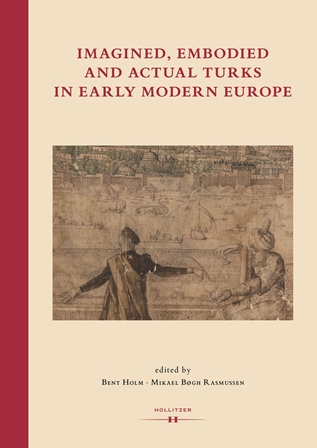
Bent Holm and Mikael Bøgh Rasmussen (eds.): Imagined, Embodied and Actual Turks in Early Modern Europe, Vienna: Hollitzer Verlag, 2021 (Ottomania 10), 554 pp., 17,5 x 24,5 cm, English, hardcover with dust jacket
ISBN 978-3-99012-124-5 (hbk) € 85,00
ISBN 978-3-99012-125-2 (pdf) € 84,99
Imagined, Embodied and Actual Turks in Early Modern Europe
The confrontation between European countries and the expanding Ottoman Empire in the early modern era has played a major role in numerous fields of history. The aim of this book is to investigate the European-Ottoman interrelations from three angles. One deals with the circumstances: How did the Europeans meet the Turks in pragmatic and diplomatic connections? Another concerns imagery: how were the Turks depicted in literature and art? The third examines performativity: how were the Turks inserted into plays, operas and ceremonies?
This book confronts mental, visual and embodied images with historical positions and conditions. The focus, therefore, is on the dynamic interactive processes of experience, embodiment and imagination in context. Bringing together Turkish and European scholars, it applies a number of research strategies used by historians to the history of art, literature, music and theatre.
Contributions by Pál Ács | Robert Born | Asli Çirakman | Anne Duprat | Kate Fleet | Bent Holm | Marcus Keller | Maria Pia Pedani | Mogens Pelt | Mikael Bøgh Rasmussen | Günsel Renda | Pia Schwarz Lausten | Charlotte Colding Smith | Suna Suner | Dirk Van Waelderen
INHALT
IX Kaleidoscopic Reflections
Bent Holm and Mikael Bøgh Rasmussen (Copenhagen)
PART I: THE ACTUAL TURK
The Ottoman Empire and Europe: The Making and Un-Making
of a Muslim-Orthodox Partnership
Mogens Pelt (Copenhagen)
The Absence of the Ottoman Empire in European Historiography
Kate Fleet (Cambridge)
The Legations of the Most Serene Republic to the Sultan and the
Fascination of Ottoman Culture
Maria Pia Pedani † (Venice)
Claiming Possession through Depiction: Hungarian Humanist Envoys
in the Ottoman Empire
Pál Ács (Budapest)
The Turks in East Central Europe, with a Focus on Hungary,
the Romanian Principalities, and Poland
Robert Born (Leipzig/Berlin)
PART II: THE IMAGINED TURK
The Image of the Turks in European Anglophone Intellectual Discourse
Aslı Çırakman (Ankara)
Changing Images and Cross-Cultural Encounters: Europe and the
Ottoman Empire
Günsel Renda (Istanbul)
Images of the Turk in Sixteenth-Century Italian Historical Writings
Pia Schwarz Lausten (Copenhagen)
Variations in Oriental Motifs in Sixteenth- and Seventeenth-Century
European Literature
Anne Duprat (Amiens)
The Turk in the Symbolic Civil Wars of France: Ally and Combatant
Marcus Keller (Urbana-Champaign, Illinois)
Shifting Identities Over Time: Images of the Turk in Sixteenth-Century
German Biblical Illustrations
Charlotte Colding Smith (Bremerhaven)
The Truthful Image(s) of the Turk(s)
Mikael Bøgh Rasmussen (Copenhagen)
PART III: THE EMBODIED TURK
“Celebrating the Orient”: The Ottomans in Prints
and Festivities
in the Habsburg Netherlands
Dirk Van Waelderen (Leuven)
Turks in Royal Rituality: Apocalyptic Historiography
in Performative Practice
Bent Holm (Copenhagen)
“Der türkische Gesandte samt sein Gefolge”: Theatre and
Ottoman Diplomacy to Vienna in the Eighteenth Century
Suna Suner (Vienna)
Prismatic Refractions
Bent Holm and Mikael Bøgh Rasmussen (Copenhagen)
APPENDIX
Bibliography
Names
Places
Curricula Vitae




